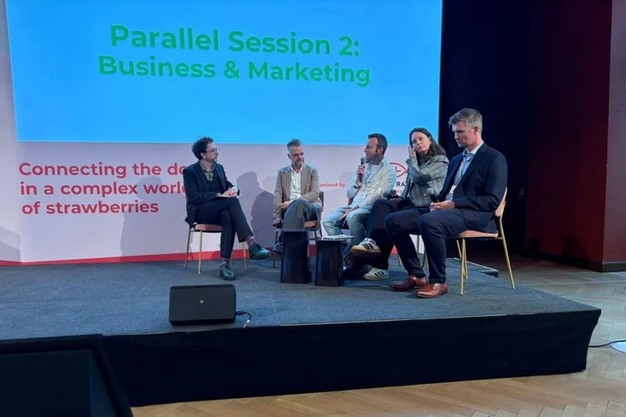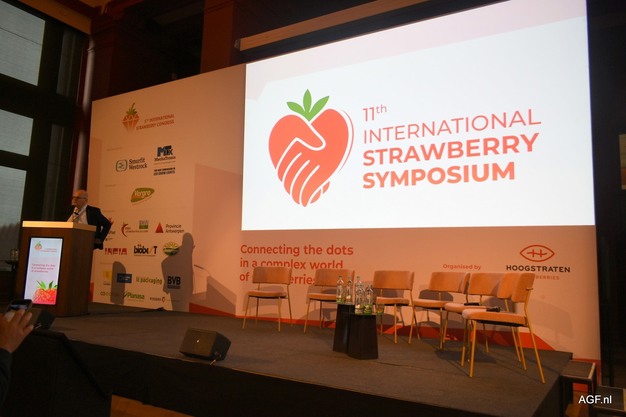From 17 to 20 September, the International Strawberry Congress 2025 took place in Antwerp. The entire strawberry sector, from research to marketing and trade, gathered in the Flemish city during these days to discuss challenges, opportunities, and trends. Under the motto "Connecting the dots in a complex world of strawberries," the use of, and approach to, Artificial Intelligence (AI) in consumer behaviour, breeding, and prediction was naturally a major topic.
Click here for the photo report
 © Jannick Flach | FreshPlaza.com
© Jannick Flach | FreshPlaza.com
In doing so, it was quick to look ahead to the future. While existing challenges such as water availability, climate change, labour shortage, and consumer behaviour were discussed, it became clear that the changing world itself is also a major concern in the sector. For example, Matthew Griffin of the 311 Institute gave a presentation on the future of food. "The global issue is: how do we ensure everyone has access to healthy, affordable food? The current food system is out of balance." He discussed various technologies and methods that could help make the food system more resilient, while still leaving room for the traditional grower. "The future of food is not about old versus new, but about a combination: traditional methods complemented by breakthrough technologies." Hudson River's Lena Maas followed this with the still heavily debated topic of CRISPR-CAS. She described this as the future of food, with Europe needing to act quickly to catch up with the U.S. and Asia.
Amelia Kalmann then turned to future consumer behaviour. The new generation of consumers is growing up with technology and AI. Companies, she argued, need to respond to this. Her key message: "Change is inevitable. To stay future-proof, organisations and individuals need to invest in skills, in well-organised data, and in time and space to experiment. Leadership, knowledge, and conscious choices will determine how responsibly and people-centred this AI future is shaped."
The attending audience was then divided into two parallel sessions: research and commercialisation. The research sessions focused on the technical aspects of cultivation, breeding, and disease control in strawberries, with innovation and AI playing an important role. The commercialisation sessions examined developments and trends in the strawberry sector. In a bird's-eye view, Philippe Binard (Freshfel Europe), Nabil Belmkaddem (BestBerries), Huan Zhang (Twinkle Star Berry), and Anouk Sijmonsma (IFPA) presented developments in the European, Moroccan, Chinese, and global strawberry sectors, which will be reported on in detail later. "Consumer preferences not only drive trends but constitute direct and profitable trade opportunities. Those who understand this well and position themselves smartly can profit in the booming strawberry market," Anouk said. The main challenges appeared to be changing weather conditions and geopolitical tensions.
 © Jannick Flach | FreshPlaza.com
© Jannick Flach | FreshPlaza.com
During the panel discussion between Tom Vanfraeyenhoven (Hashting Solutions), Jan Engelen (Coöperatie Hoogstraten), Marieke Appel (Driscoll's), and Bart De Langhe (KU Leuven) on branding and marketing, it became clear how brands and private labels can coexist, each with their own role: brands offer experience and distinction, private labels provide volume and price advantage. Successful brand building can also be done with limited resources, provided there is a focus on quality, creativity, and smart use of digital tools. Social media and packaging play an important role in brand communication, but there is still a need for balance. In times of price pressure, it remains important to add value, for instance by positioning products as treats or gifts. Curd Vanmarcke (Vergro), Michiel Vermeiren (Coöperatie Hoogstraten), and Joeri Beniest (Lidl Belgium) then explained their strategic partnership and its benefits, such as accommodating overproduction with promotions in supermarkets.
Sustainability was also an important theme, as it is across many sectors today. In the panel discussion between Roland Sweijen (Limgroup), Jan van Anken (Flevo Berry), Yuki Otsuka (Miyoshi Group), Teunis Sikma (Fresh Forward Breeding), and Alfonso Lopez (Planasa), the discussion focused on the future direction of varieties. The panellists emphasised that the future of strawberry breeding lies in innovation, differentiation, and sustainability. Hybrid strawberries, which can be grown from seed, provide more flexibility for growers and reduce labour. Flavour and aroma are gaining importance, with regional preferences and premium segments creating opportunities. Japanese genetics focuses on unique flavour traits, while European breeders are working on broad portfolios and new technologies. Sustainability, including reduced water consumption, energy, and chemical use, was seen as a starting point, along with easier cultivation and improved disease tolerance.
 © Jannick Flach | FreshPlaza.com
© Jannick Flach | FreshPlaza.com
The two plenary days were concluded by Tom Van Delm (Proefcentrum Hoogstraten) and Hans Vanderhallen (Coöperatie Hoogstraten). "Over the past few days, we once again experienced the power of connection: the connection between research and practice, between craftsmanship and innovation, and within a global network of professionals who together are shaping the future of the sector," said Tom. Hans added: "Moreover, as director of Coöperatie Hoogstraten, I am particularly proud that, after five successful editions of the International Strawberry Congress, we will be able to co-host the ISHS International Strawberry Symposium in 2028 together with Proefcentrum Hoogstraten." After this, Hans unveiled the new logo of the International Strawberry Symposium.
"And we are taking it one step further: for the first time, we are integrating the sixth edition of our International Strawberry Congress into this symposium. We believe it is essential for science and the commercial world to meet and interact – not separately, but together, in the same venue. The result will be a six-day event that enables high-level scientific exchange, bridges research and industry, offers working visits and field excursions, showcases innovation at the research centre, and concludes with the International Mechanisation and Demonstration Days in Hoogstraten."
"This is why we invite everyone: scientists, growers, companies, policymakers, and all strawberry lovers. We look forward to welcoming everyone to Antwerp in 2028, from 28 August to 2 September." With the end of the two plenary days, however, ISC 2025 was not yet finished. Two more practical days with company visits and a mechanisation day followed, with more still to come.
Click here for the photo report
For more information:
Coöperatie Hoogstraten
Loenhoutseweg 59
2320 Hoogstraten, Belgium
Tel: +32 33 40 02 11
[email protected]
www.hoogstraten.eu
www.iscbelgium.com
